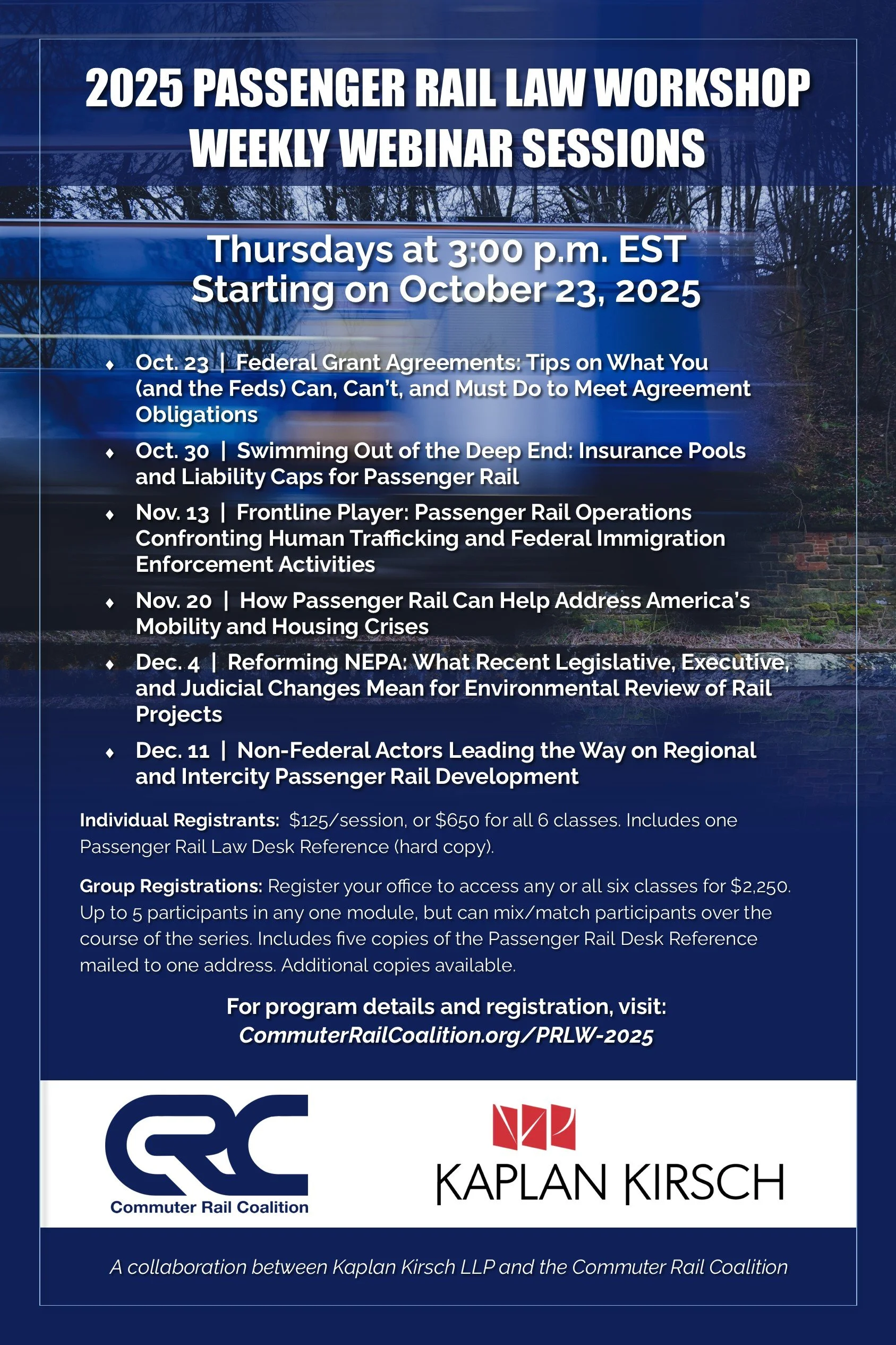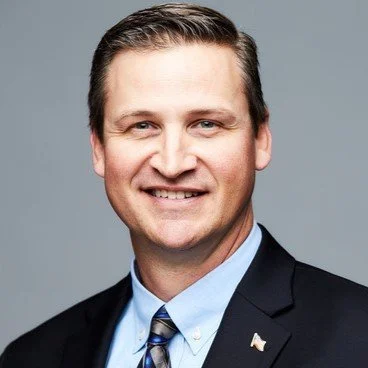
Join the Commuter Rail Coalition and Kaplan Kirsch LLP for the 2025 Passenger Rail Law Workshop - Weekly Webinar Sessions.
The Passenger Rail Law Workshop is a unique opportunity to hear from industry leaders and practitioners as they dive into the fundamental legal principles that underpin nearly every aspect of passenger rail law. You can also expect timely updates on recent legal developments impacting the industry, as well as a copy of the invaluable Passenger Rail Law Desk Reference.
Scroll down the page for a full list of sessions, this year provided as webinar sessions from October 23 through December 11.
CLE ACCREDITATION
CLE accreditation is granted on a state-by-state basis. Each state has its own rules and regulations that define eligible course content for CLE credit. Due to varying state bar approval procedures, we cannot foresee how many credits the workshop will be approved for. However, typically this type of course earns approximately 1 hour of general CLE credits per session (for a total of 6 hours for all six sessions).
It is the responsibility of each participant to file the appropriate paperwork with their own state bar(s) for continuing legal education (CLE) for this course.
All participants will receive a certificate certifying their attendance within about a week of each webinar (in order to submit for CLE credits in their state).
Most states have reciprocity agreements with one or more of the states listed below:
Colorado Course ID: application pending
Pennsylvania Course ID: application pending
Virginia Course ID: application pending
NOTE: These are the only states we will be submitting to for CLE credit. Please check back here to see which states have approved the course and for how many credits.
Registrants may request accreditation from their specific state after the workshop series has taken place by providing course materials and proof of attendance. Course information will be updated as it is received. Do not report hours until the last session has taken place.
If you have questions about the approved CLE credits or certificates of attendance, please email marketing@kaplankirsch.com.
PRLW WEBINAR 1 | Thursday, October 23, 2025 | 3:00 p.m. EST
Federal Grant Agreements: Tips on What You (and the Feds)
Can, Can’t, and Must Do to Meet Agreement Obligations
COMPLETED
Grant Agreements are a cornerstone of the relationship between the federal government and most passenger rail services. This session will provide insights into how to navigate the increased scrutiny of Grant Agreement compliance before, during, and after an award is made. It will also provide an overview of the rights and responsibilities of the federal government under Grant Agreements and the rights and recourse of grant recipients when faced with a dispute regarding their Grant Agreement compliance or delay in funding. The session will also discuss recent disputes concerning impoundment of federal funds, and provide an update on key litigation.
Moderator:
-
Ayelet Hirschkorn is a strong and effective advocate with extensive experience in the transportation industry. She successfully manages, drafts, and negotiates agreements for some of the nation’s largest transportation projects and advises her clients on federal and state policies, statues, and regulations in the railroad, environmental, utility and procurement industries. Ayelet also represents commuter rail agencies before the Surface Transportation Board, federal and state courts on a variety of issues including railbanking, abandonment of rail lines, environmental reviews, federal preemption and expansion of freight and intercity rail services. Ayelet spent a majority of her career in public service, ensuring that commuter agencies maximize their transportation services in an efficient and accessible manner.
Panelists:
-
Subash brings a significant depth of legal and public policy experience to the firm, including senior roles at USDOT and NY Metropolitan Transportation Authority (MTA), North America’s largest transit agency. As USDOT Acting General Counsel, he served as Transportation Secretary Pete Buttigieg’s top legal advisor, overseeing a 500-person legal team, leading the Department’s rulemaking agenda, streamlining processes to expedite project delivery, defending landmark transportation and environmental policies, and leading the Department’s legal work on international matters. As Chief Counsel at the Federal Transit Administration (FTA), Subash worked to implement the historic Infrastructure Investment and Jobs Act and oversaw all FTA legal matters, including on Buy America compliance and safety and labor regulations. Prior to joining USDOT, Subash served as special counsel at the MTA and a litigator in private practice in Washington, D.C., where he helped deliver multiple Supreme Court and court of appeals victories for his clients.
-
Faris Mohammed is an attorney with experience in environmental and infrastructure law. He currently serves as the Deputy Assistant Chief Counsel for Development Law at the U.S. Department of Transportation’s Federal Railroad Administration advising on the agency’s multi-billion-dollar financial assistance portfolio. He has also worked at the White House Council on Environmental Quality where he supported federal policy initiatives on environmental review and permitting reform. He earned his Juris Doctor from Emory Law School and has a Bachelor’s of Science from the University of California, Berkeley.
-
John Putnam is a seasoned attorney and policymaker with extensive experience in transportation, environmental, and energy law. Over his career, he has led in federal and state agencies, serving as the General Counsel for the United States Department of Transportation, Senior Advisor to the Governor of Colorado including chief negotiator for the Moffat Tunnel, and representing Colorado DoT on rail matters. His practice has focused on navigating complex federal and state regulations to deliver innovative solutions for infrastructure, sustainability and safety challenges. Known for his strategic counsel, John has played a pivotal role in advancing policies and projects that balance development, environmental stewardship, and community needs. His work includes implementation of the Federal Infrastructure Investment and Jobs Act of 2021 (Bipartisan Infrastructure Law), renegotiation of the historic Moffat Tunnel lease under the Continental Divide, and provision of passenger rail access from Denver to the mountains, as well as efforts to develop and implement legislation to fund Colorado rail initiatives and preserve rail lines affected by coal plant and mine shutdowns.
PRLW WEBINAR 2 | Thursday, October 30, 2025 | 3:00 p.m. EST
Swimming Out of the Deep End: Insurance Pools and Liability Caps for Passenger Rail
COMPLETED
Allocating and mitigating financial risk is a key concern for passenger rail owners and operators. This panel will explore the latest legal developments for two important tools that serve to mitigate the financial exposure of passenger rail systems: insurance pools and the federal statutory liability cap. Passenger rail insurance pools are mechanisms where multiple railway operators or entities share the risks and costs associated with passenger rail accidents or incidents. This pooling of risks and resources can help ensure financial stability and accessibility of rail services, especially for operators who might struggle to afford individual insurance premiums. The rail passenger transportation liability cap is a maximum amount of money a passenger rail operator can be held liable for injuries or deaths resulting from an accident. The cap is adjusted every five years, with the next adjustment occurring at the end of the year.
Moderator:
-
John Putnam is a seasoned attorney and policymaker with extensive experience in transportation, environmental, and energy law. Over his career, he has led in federal and state agencies, serving as the General Counsel for the United States Department of Transportation, Senior Advisor to the Governor of Colorado including chief negotiator for the Moffat Tunnel, and representing Colorado DoT on rail matters. His practice has focused on navigating complex federal and state regulations to deliver innovative solutions for infrastructure, sustainability and safety challenges. Known for his strategic counsel, John has played a pivotal role in advancing policies and projects that balance development, environmental stewardship, and community needs. His work includes implementation of the Federal Infrastructure Investment and Jobs Act of 2021 (Bipartisan Infrastructure Law), renegotiation of the historic Moffat Tunnel lease under the Continental Divide, and provision of passenger rail access from Denver to the mountains, as well as efforts to develop and implement legislation to fund Colorado rail initiatives and preserve rail lines affected by coal plant and mine shutdowns.
Panelists:
-
John has served as Metra’s Deputy General Counsel since 2015. His previous positions at Metra (which he joined in 2009) were as Senior Trial Counsel, Director of Risk Management, and Senior Director of Litigation and Risk Management.
John has over 40 years of experience as a trial attorney in both Michigan and Illinois. John earned both his Bachelor of Arts (with honors) and Law Degrees at Wayne State University in Detroit, Michigan. Following graduation, he served as a senior staff attorney for the United States District Court for the Eastern District of Michigan. Prior to joining Metra, John was a partner in a mid-sized Chicago defense firm for over 10 years.
In 2025, John was awarded the David W. Fries Award by the Railroad Insurance Management Association (RIMA) of the Association of American Railroads for exemplary risk management efforts and practices in the railroad industry.
-
Kevin Woods is the Managing Director of Gallagher's Railroad Services for the
Transportation Practice Group, bringing over 30 years of experience in property and
casualty insurance. His career began in 1994 as a flood underwriter before transitioning to commercial insurance underwriting. In 2000, Kevin launched an independent retail brokerage company, which merged with Gallagher in 2012. He was named National Director of the Railroad Services Division in 2015 and later promoted to Managing Director in 2023.
Kevin has spent over 25 years developing and managing insurance programs for rail
industry clients. He has extensive expertise in ensuring proper coverage applicability and providing general insurance support for short-line railroads, rail contractors, rail industry manufacturers, trans-load operations, public transportation, and belt railroads. His role
includes managing marketing strategies and negotiating complex insurance coverages with rail carriers on behalf of Gallagher clients. Kevin's dedication and problem-solving skills have earned him recognition as a Transportation Power Broker® by Risk & Insurance in 2022, 2024, and 2025.
-
Chelsea Carter is an Executive Vice President for Artex Risk Solution. She oversees one of Artex’s growing captive division in North America and is responsible for all aspects of the strategy from new business, renewals, new program development, client retention and stewardship.
Prior to her current role, Chelsea was the Senior Vice President of Business Development for Artex Risk Solutions. She focused her business development efforts on a region and national level. In addition, also was a member of Artex’s Sales, Analytics and Advisory committee, which is global taskforce designed to bring together Artex’s subject matter experts across all product segments globally. This allows Artex to approach each program in a holistic manner bringing tailored solutions to each and every client. Chelsea also had a practice focus in the rail, real estate, higher education and healthcare industry. Specific to property and casualty risks, she specialized in the formation of single parent captives, group captives for middle market clients in various industries for property and casualty risks. Additionally, Chelsea helped employers evaluate the opportunity to utilize captive solutions specific to their employee benefit risk.
Throughout her career at Artex and Gallagher, Chelsea provides a comprehensive and consultative approach to evaluating the alternative risk marketplace across all elements of the organization
Chelsea began her insurance career in 2011 as a member of Gallagher’s Summer Internship Program and re-joined Gallagher full-time in 2018. Prior to Gallagher, Chelsea held various sales and marketing roles working for the U.S. Men’s Open Golf Championship (2013-2015) and Ernst & Young LLP (2015-2018).
Chelsea received a bachelor’s degree from Lehigh University, Bethlehem, PA. She has earned a Commercial Lines Coverage Specialist designation.
In 2024, Chelsea was named Captive International’s “40 under 40” list recognizing the next generation of captive insurance industry leaders.
PRLW WEBINAR 3 | Thursday, November 13, 2025 | 3:00 p.m. EST
Frontline Player: Passenger Rail Operations Confronting Human Trafficking and Federal Immigration Enforcement Activities
COMPLETED
This session will cover key legal considerations raised by the frontline role that passenger rail systems and facilities may play in law enforcement efforts, focusing on two current hot-button issues: human trafficking and enforcement of federal immigration laws. Panelists will review the various legal obligations of public agencies in both of these areas and discuss examples of strategies pursued to navigate legal requirements and address policy priorities.
Moderator:
-
Allison Ishihara Fultz brings a wealth of expertise in transactional and regulatory matters related to transportation infrastructure. Her diverse client portfolio includes public transportation agencies, state and local governments, private entities, and safety oversight organizations. Allison’s practice encompasses a wide array of issues, such as the acquisition and abandonment of railroad rights-of-way, agreements for shared use of freight and passenger rail corridors, and the conversion of rail corridors into recreational trails under the rails-to-trails program. Before rejoining the firm, Allison served as Chief Counsel of the Federal Railroad Administration (FRA), where she was the agency’s top legal officer. In this role, she provided strategic counsel on complex regulatory, legislative, and policy matters affecting the nation’s rail system to FRA and US Department of Transportation leadership. Leading FRA’s team of legal professionals, she helped guide FRA’s implementation of the historic Infrastructure Investment and Jobs Act, and ensured compliance with federal laws while advancing the agency’s mission to promote safety, efficiency, and sustainability in rail transportation.
Panelists:
-
Jared Garth is a Senior Associate General Counsel with Amtrak. He focuses on Employment & Labor litigation and supports Amtrak Police Department (APD) and Corporate Security operations. He is also responsible for Americans with Disabilities Act (ADA) litigation and compliance. Prior to joining Amtrak, he served as a Supervisory Special Agent (SSA) with the Federal Bureau of Investigation (FBI). Mr. Garth was an FBI Agent for twenty-one (21) years. He worked in the New York Field Office, Portland, Oregon Field Office, and FBI Headquarters. He worked on a variety of FBI classifications including counterintelligence, counterterrorism, white collar crimes, asset forfeiture, and crimes against children. He was also a Special Assistant U.S. Attorney for two years in the District of Oregon and prosecuted crimes on the Warm Springs Indian Reservation. Before becoming an FBI Special Agent, Mr. Garth was a prosecutor in Spokane, Washington. He also served as a law clerk for the Washington State Court of Appeals, Division III. Mr. Garth is a 1994 graduate of the Gonzaga University School of Law in Spokane, Washington. He holds an undergraduate degree in Art History from Skidmore College in Saratoga Springs, New York.
-
In May 2023, Kathy Silbaugh joined the Washington Metrorail Safety Commission as its first in-house General Counsel. For the prior 5.5 years, she was the General Counsel at the National Transportation Safety Board. She also started her federal government career at the NTSB, serving as a staff attorney between 2000-2010. In between her two tenures at the NTSB, she served at the Department of Justice as the Deputy Director for the Departmental Ethics Office, which administers the ethics program for DOJ. Ms. Silbaugh continued her federal ethics work for the Judiciary, as the principal legal advisor to the Judicial Conference Committee on Financial Disclosure. The Committee is comprised of sixteen Federal District and Circuit Court judges from throughout the country. And just prior to rejoining the NTSB in 2017, she worked at the Department of Health and Human Services as the Deputy Associate General Counsel and Alternate Agency Ethics Official. Ms. Silbaugh earned her undergraduate degrees in History and Psychology from Lafayette College and her Juris Doctor from the Catholic University of America Columbus School of Law.
-
Laura Kilgarriff brings a decade of federal regulatory expertise to Kaplan Kirsch. Prior to joining the firm, she served as Assistant Chief Counsel for Security Policy and Acting Assistant Chief Counsel for Regulations and Security Standards for the Transportation Security Administration (TSA) Chief Counsel Office. Ms. Kilgarriff oversaw legal issues related to TSA’s issuance of regulations, security programs, security directives, and guidance across all modes of transportation, including aviation, freight railroads, public transportation systems, passenger railroads, motor carriers, pipelines, and maritime. As a senior TSA lawyer, she regularly coordinated and negotiated with other U.S. government entities on TSA programs and policies, including the Department of Homeland Security (DHS), the Department of the Transportation (DOT), Federal Aviation Administration (FAA), Department of Justice (DOJ), Federal Bureau of Investigation (FBI), Department of Defense (DOD), White House Office of Management and Budget (OMB), and the National Security Council (NSC). Ms. Kilgarriff received her undergraduate degree from Allegheny College and earned her Juris Doctor at the George Washington University Law School.
PRLW WEBINAR 4 | Thursday, November 20, 2025 | 3:00 p.m. EST
How Passenger Rail Can Help Address America’s Mobility and Housing Crisis
COMPLETED
This panel session will explore effective legal strategies for fostering partnerships between public agencies and private developers to facilitate development tackling two of the big issues facing communities: mobility and affordable housing. Panelists will discuss successful case studies that illustrate how collaboration can enhance urban planning, improve transit accessibility, and stimulate economic activity while also tackling major housing shortages, particularly for lower income residents. The session will cover legal aspects of successful partnerships, including key mechanisms and regulatory frameworks. Attendees will learn about the legal benefits and challenges of aligning public transit goals with private development interests, as well as innovative approaches to creating sustainable, transit-oriented communities.
Moderator:
-
Hanna Gustafsson is a real estate and land use lawyer specializing in the land use entitlements process. Hanna represents private and public sector clients on a wide variety of municipal law issues, development and real estate matters, and environmental review. Hanna has guided both developers and municipal officials through the land use and entitlement approval process involving development agreements, mixed-use TOD developments, and affordable housing considerations. She advises on development potential, prepares real estate agreements, and guides clients through zoning diligence in connection with acquisitions and financings. Prior to commencing her legal career, Hanna was an Urban Fellow with the New York City Department of Transportation, and has maintained a keen interest in the intersection of transportation, housing and land use planning ever since.
Panelists:
-
As the Transit-Oriented Development Manager at RTD in Denver, Colorado, Chessy coordinates with developers, local jurisdictions, and her RTD colleagues to support TOD at and around RTD stations. Chessy's team studies parking, affordable housing, and land use policy with the goal of reducing challenges to equitable TOD that creates community benefits and increases transit ridership. Chessy is a twin mom and a certified planner. She holds an M.B.A. from the University of Denver, an M.S. in City & Regional Planning from Pratt Institute, and a B.A. from Brown University.
-
Mike Heyer is a real estate professional with more than a decade of experience across state, municipal, non-profit, and private sector projects. He has led redevelopment initiatives focused on transit-oriented development (TOD), public-private partnerships, and affordable housing. At NJ TRANSIT, he advances TOD opportunities on and near agency-owned property to help create vibrant communities that support transit use. His work addresses complex transportation, economic, and land use challenges with creative, practical solutions. Mike earned a Master’s in Real Estate Development from Columbia University’s Graduate School of Architecture, Planning and Preservation (GSAPP) and a Bachelor of Architecture with Certificates in Historic Preservation and Urban Design from the University of Miami.
-
Steve Maddoux is an Assistant City Attorney in the Austin City Attorney’s Office, Land Use and Real Estate Division. Steve has 20 years’ experience in real property development involving real estate transactions, easements, zoning, eminent domain, business entity formation, and litigation. Steve started with the City of Austin in 2019 and is involved in zoning cases and code amendments, including transit oriented development districts, station area plans, equitable transit-oriented development districts, comprehensive plan, and density bonus programs.
-
Casey Morris’ practice focuses primarily on transportation and environmental law, addressing a broad range of legal matters related to the planning, operation, and regulation of transit and rail systems. Prior to joining the firm, Casey served as counsel for the Federal Railroad Administration, where she specialized in federal grants and environmental reviews under the National Environmental Policy Act (NEPA). She began her legal career as an Honors Attorney at the U.S. Department of Transportation (DOT), providing legal counsel to the Federal Aviation Administration, Federal Transit Administration, Federal Railroad Administration, Maritime Administration, Office of the Inspector General, and the Office of General Counsel. At DOT, her work spanned environmental law, rulemaking, federal financial assistance, civil rights, employment, criminal law, and the implementation of the Infrastructure Investment and Jobs Act (IIJA), also known as the Bipartisan Infrastructure Law (BIL), among other issues affecting all modes of transportation.
PRLW WEBINAR 5 | Thursday, December 4, 2025 | 3:00 p.m. EST
Reforming NEPA: What Recent Legislative, Executive, and Judicial Changes Mean for Environmental Review of Rail Projects
COMPLETED
The past several years have seen changes from Congress, the current and previous Administrations, and the courts affecting the environmental review of processes under the National Environmental Policy Act (“NEPA”). This session will track some of these changes and their implications for undertaking new projects requiring NEPA review. The panelists will share with attendees what has, and has not, changed, in undertaking NEPA review of a project and will provide insights into how this will shape environmental review of future projects.
Moderator:
-
Casey Morris’ practice focuses primarily on transportation and environmental law, addressing a broad range of legal matters related to the planning, operation, and regulation of transit and rail systems. Prior to joining the firm, Casey served as counsel for the Federal Railroad Administration, where she specialized in federal grants and environmental reviews under the National Environmental Policy Act (NEPA). She began her legal career as an Honors Attorney at the U.S. Department of Transportation (DOT), providing legal counsel to the Federal Aviation Administration, Federal Transit Administration, Federal Railroad Administration, Maritime Administration, Office of the Inspector General, and the Office of General Counsel. At DOT, her work spanned environmental law, rulemaking, federal financial assistance, civil rights, employment, criminal law, and the implementation of the Infrastructure Investment and Jobs Act (IIJA), also known as the Bipartisan Infrastructure Law (BIL), among other issues affecting all modes of transportation.
Panelists:
-
Nate counsels clients in permitting, regulatory compliance, and litigation under a broad range of environmental and administrative laws related to water, public lands, energy, rail, aviation, and transportation. He regularly litigates environmental, natural resource, and land use issues before federal and state courts across the country, including at the U.S. Supreme Court. Nate also advises clients in permitting and compliance before regulatory agencies, with a focus on issues arising under the federal Clean Water Act, National Environmental Policy Act, Endangered Species Act, and state environmental laws.
-
Lana leads the Federal Railroad Administration’s (FRA) NEPA and Technical Resources Team of subject matter experts who provide technical assistance to railroad grant recipients in meeting Federal environmental review requirements in the delivery of railroad infrastructure projects. She manages the FRA’s NEPA Assignment Program and worked on the FRA, the Federal Highway Administration (FHWA), and the Federal Transit Administration’s interim final rule modifying the regulations implementing NEPA that apply to all three agencies. In her previous role as an Environmental Protection Specialist in FHWA’s Office of Project Development and Environmental Review, she developed the One Federal Decision process chart for implementation of Executive Order 13807, Establishing Discipline and Accountability in the Environmental Review and Permitting Process for Infrastructure Projects.
-
Katie van Heuven is an expert on a broad range of environmental and land use issues and specializes in airport and transportation projects. She has advised airport clients on pending environmental reviews for ongoing development projects, including the Chicago O’Hare Modernization Program, the Los Angeles International Airport (LAX) Airport Terminal Modernization Project, the new parallel runway at Charlotte International Airport, and the development of a new, supplemental commercial service airport in Las Vegas. Katie has extensive experience litigating airport issues, including claims arising under the National Environmental Policy Act (“NEPA”) and the Clean Air Act, and various federal aviation statutes. In addition, Katie provides strategic counsel to numerous airport sponsors on regulatory compliance matters including revenue use, grant assurance compliance, obligations arising under federal aircraft-noise statutes and securing FAA approvals related to land acquisition and development.
PRLW WEBINAR 6 | Thursday, December 11, 2025 | 3:00 p.m. EST
Non-Federal Actors Leading the Way on Regional and Intercity Passenger Rail Development
This panel session will focus on the legal issues arising from the pivotal role that non-federal actors are playing in advancing regional and intercity passenger rail development. Panelists will highlight successful initiatives and innovative legal strategies implemented by various states to enhance rail services and connectivity. The discussion will cover the legal aspects of key projects, funding mechanisms, and collaborative efforts between state agencies and local stakeholders aimed at improving passenger rail infrastructure and service quality. Attendees will gain insights into the legal challenges and opportunities faced by states in promoting rail development, as well as best practices that can be adopted elsewhere. This session will provide a comprehensive overview of how the law is implicated as state, regional, and local entities shape the future of regional and intercity passenger rail across the nation.
Moderator:
-
John Putnam is a seasoned attorney and policymaker with extensive experience in transportation, environmental, and energy law. Over his career, he has led in federal and state agencies, serving as the General Counsel for the United States Department of Transportation, Senior Advisor to the Governor of Colorado including chief negotiator for the Moffat Tunnel, and representing Colorado DoT on rail matters. His practice has focused on navigating complex federal and state regulations to deliver innovative solutions for infrastructure, sustainability and safety challenges. Known for his strategic counsel, John has played a pivotal role in advancing policies and projects that balance development, environmental stewardship, and community needs. His work includes implementation of the Federal Infrastructure Investment and Jobs Act of 2021 (Bipartisan Infrastructure Law), renegotiation of the historic Moffat Tunnel lease under the Continental Divide, and provision of passenger rail access from Denver to the mountains, as well as efforts to develop and implement legislation to fund Colorado rail initiatives and preserve rail lines affected by coal plant and mine shutdowns.
Panelists:
-
Michelle Bouchard is the Executive Director of Caltrain, having been unanimously appointed to the position by the Caltrain Board of Directors on November 3, 2022 after serving in an acting capacity since April 2021. Ms. Bouchard is also the Chair of the Board of Directors for the Commuter Rail Coalition. Caltrain provides rail service from Gilroy to San Francisco by way of San Jose and the Silicon Valley, serving one of the largest economies in the world with 32 stations including two major intermodal terminals. Ms. Bouchard has more than 25 years in the transit industry. She also has a long history with Caltrain, having spent more than 20 years in progressively responsible positions. Ms. Bouchard has overseen the implementation of Positive Train Control and completion of the Strategic Business Plan, including a Long Range Service Vision for the railroad. She has overseen a $2.44 billion Electrification project, which has transformed Caltrain service after beginning revenue service in 2024.
-
Michael Westermann joined VPRA in November 2021 as General Counsel, having most recently served as the Senior Assistant Attorney General for the Office of the Attorney General, Virginia, for six years. With an expertise in large transportation transactions, he was instrumental in the landmark Transforming Rail in Virginia agreements that will modernize rail in the Commonwealth. Prior to his work with the Office of the Attorney General, he served as an Assistant County Attorney in Henrico County, Virginia, negotiating a high volume of complex business contracts including banking, construction, and IT contracts. Mr. Westermann earned his bachelor’s degree from the University of Virginia, his Juris Doctor from the University of Alabama School of Law and was admitted to the Virginia Bar in October 2008.
-
Lisa is a seasoned executive leader and strategist with over two decades of experience navigating complex political, regulatory, and stakeholder environments at the highest levels of state and federal government.
Lisa oversees a portfolio of special projects and assignments that are of focus for Governor Polis’ second term agenda. Such projects include establishing several new passenger rail services in Colorado before the end of the Governor’s term, including Mountain Rail from Denver to Winter Park, Granby on to Steamboat Springs and Craig; the second passenger rail project includes the Northern Front Range Joint Service Passenger Rail from Denver to Fort Collins and overseeing the state’s efforts to redevelop Burnham Yard, a historic rail yard in the heart of Denver that predates statehood. Lisa served as the State’s lead negotiator to the railroads for the Moffat Tunnel and Mountain Rail Access Agreement. Lisa also serves as the Governor’s chief political strategist and advisor on state and federal policy alignment.
Prior to serving in this capacity, Lisa served as Chief of Staff for the Governor’s entire first term. She managed the state’s executive branch through historic challenges, including the COVID-19 pandemic, while overseeing cabinet operations, emergency response strategy, and long-term policy execution across healthcare, education, and economic development.
Before becoming Chief of Staff she served as chairwoman of the Governor’s gubernatorial campaign and transition committee. She also served as then congressman Polis’ Colorado Chief of Staff from 2014 to 2017 in his Congressional office.
Kaufmann also co-founded New Era Colorado, a nationally recognized nonprofit focused on civic engagement and leadership development, and has worked as senior advisor to Joe Neguse, Assistant Democratic Leader in the US House of Representatives. And she currently serves on Colorado’s Supreme Court nominating committee.

























